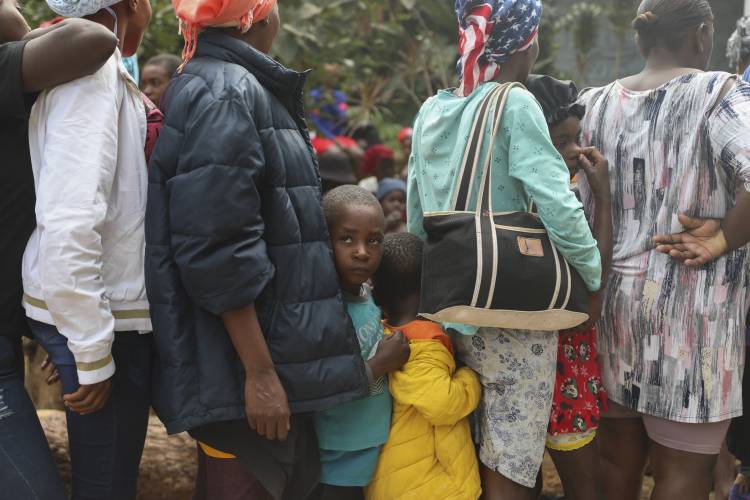Opinion: The double standard of Trump’s TPS revocation

People line up to receive food at a shelter for families displaced by gang violence in Haiti. Odelyn Joseph / AP
| Published: 03-29-2025 6:00 AM |
Judith Kumin lives in Contoocook. She is a retired official of the UN Refugee Agency (UNHCR).
President Trump announced on March 21 that he is revoking Temporary Protected Status (TPS) for citizens of Cuba, Haiti, Nicaragua and Venezuela.
A country is designated for TPS by the Secretary of the Department of Homeland Security (DHS) when conditions in that country prevent its nationals from returning safely. This can be because of an ongoing civil war, an environmental disaster or “other extraordinary and temporary conditions.” Nationals of a designated country who are already in the U.S. on the date TPS takes effect are not removable and may apply for employment authorization. Once granted temporary status, an individual cannot be detained by DHS solely based on their immigration status. And contrary to popular belief, TPS beneficiaries are not entitled to any federal benefits, even though those who have jobs pay federal withholding tax like the rest of us.
Of all the revocations, removing protection from Haitians is the most shocking.
Haiti has been a conflict zone with escalating gang violence since 2021, when President Juvenal Moise was murdered in a bizarre plot that many observers believe involved senior police officers. Last year alone, gangs killed over 5,600 people, and the deployment of more than 1,000 Kenyan police to the country has done little to stem the violence.
The State Department’s own travel advisory for Haiti reads: “Do not travel to Haiti due to kidnapping, crime, civil unrest and limited health care.” It further warns that “[s]ince March 2024, Haiti has been under a State of Emergency. Crimes involving firearms are common in Haiti. They include robbery, carjackings, sexual assault and kidnappings for ransom. Shortages of gasoline, electricity, medicine and medical supplies are common throughout the country. Public and private medical clinics and hospitals often lack trained staff and basic resources. In addition, they require prepayment for services in cash … Protests, demonstrations and roadblocks are common and unpredictable. They often damage or destroy infrastructure and can become violent. Mob killings and assaults by the public have increased, including targeting those suspected of committing crimes. The airport in Port-au-Prince can be a focal point for armed activity. Armed robberies are common. Carjackers attack private vehicles stuck in traffic. They often target lone drivers, especially women.”
Recently, the Federal Aviation Administration extended its ban on commercial flights by U.S. carriers to the Haitian capital, Port-au-Prince, through Sept. 8, 2025. The ban was first imposed in November 2024 after gunfire hit several U.S. planes attempting to land. For companies that insure airlines, Haiti falls in the same category as cities like Tel Aviv and Beirut.
Article continues after...
Yesterday's Most Read Articles
 To provide temporary shelter, Concord foots the bill for hotel stays for people experiencing homelessness
To provide temporary shelter, Concord foots the bill for hotel stays for people experiencing homelessness
 Authorities believe mother shot three year-year-old son in Pembroke murder-suicide
Authorities believe mother shot three year-year-old son in Pembroke murder-suicide
 Coffee, community and sustainability coming to Hopkinton store under new ownership
Coffee, community and sustainability coming to Hopkinton store under new ownership
 Concord Police investigating vehicle versus pedestrian accident in downtown
Concord Police investigating vehicle versus pedestrian accident in downtown
 ‘It was all about people’: New Hampshire remembers down-to-earth ‘humanity’ of David Souter, retired U.S. Supreme Court Justice
‘It was all about people’: New Hampshire remembers down-to-earth ‘humanity’ of David Souter, retired U.S. Supreme Court Justice
 Hometown Hero: Joan Follansbee energizes morning drop-offs with dance moves
Hometown Hero: Joan Follansbee energizes morning drop-offs with dance moves
The United Nations expert on the human rights situation in Haiti, William O’Neill, reported in early March on his latest visit to the country. Speaking of the gangs that now control 85% of Haiti’s capital he said: “These violent criminal groups continue to extend and consolidate their hold beyond the capital. They kill, rape, terrorize, set fire to homes, orphanages, schools, hospitals, places of worship, recruit children and infiltrate all spheres of society. All this, with the utmost impunity and sometimes, as many sources point out, with the complicity of powerful actors.”
This gang violence has displaced over a million Haitians — in addition to the millions who lost their homes in the 2010 earthquake that killed a quarter of a million people. Any Haitians forced back from the U.S. will only add to the number of homeless and will be additional prey for the gangs. O’Neill made an impassioned plea to the international community to implement the commitments it has made to saving lives in Haiti, saying, “There is not a day to lose. There is no alternative. Haiti’s survival is at stake.”
The U.S. Department of State emphatically states that Americans should not travel to Haiti. The U.S. FAA bans American airlines from flying to Port-au-Prince. Yet this is the country Trump considers safe enough for Haitians to return to.







 Opinion: My memories of Vietnam 50 years later
Opinion: My memories of Vietnam 50 years later Opinion: Concord officials: Can we sit and talk?
Opinion: Concord officials: Can we sit and talk? Opinion: Trump versus the U.S. Constitution
Opinion: Trump versus the U.S. Constitution Opinion: Protect our winters!
Opinion: Protect our winters!
